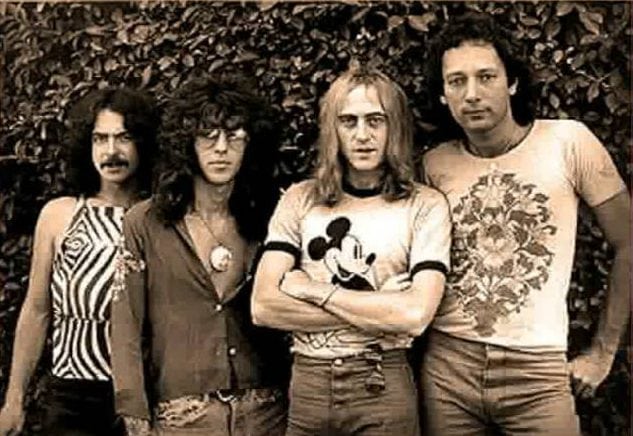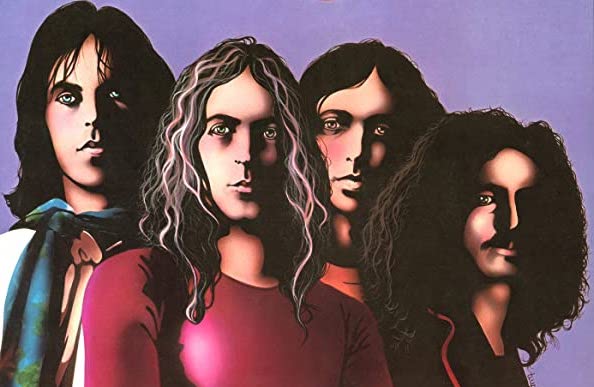“We quit!” Those are not the words I want to hear at six o’clock in the morning. Especially from these two roadies. I had already been warned that they might be trouble, but the way they are going about it is well…a surprise and a really messed up thing to do. Now I have the chore of getting the band’s equipment from Tuscaloosa, Alabama to Augusta, Georgia for tonight’s show. That is some 350 miles and that is a problem. But first, a little background…
It was shortly after I left the gig as road manager for Labelle when Wayne Forte from Creative Management Associates (CMA) called me and says, “I have an interview for you with Sidney A. Seidenberg, Inc. (SAS Inc.) He manages Ian Lloyd and Stories and they need a road manager.”Stories is coming off a monster hit single, “Brother Louie,” that was number one nationally for the whole summer of 1973.
I meet with Sid and he tells me that the original road manager is gone but that there are two roadies want that job. They are tight with the band and Sid thinks they are trying to steal the act from him.

He hires me, a good offer, pay and per diem. He instructs me to go to the rehearsal and introduce myself. The band knows I am coming so it is not a surprise for them when I walk in. They are ambivalent when they meet me but not rude. Ken Bichel, the keyboard player, leans into me when we shake hands and says, “not everyone is against you.” In addition to Ken and singer Ian Lloyd the rest of the band at the time included guitarist Richie Ranno, bassist Kenny Aaronson, and Bryan Madey on drums.
Later in the week the band and I meet at LaGuardia airport and fly to Tuscaloosa. The road crew and the equipment are already at the gig unloading. After checking in to the hotel we drive the rental car over to the club. We do a soundcheck and hang around for the gig. I see the two roadies and I ask them about soundcheck, and they answer me in a snarky way with big grins. No problem, I do not need new friends. The show goes well, and the band is quite good, and when they play “Brother Louie” the crowd goes crazy. After the show, it is straight back to the hotel because we have a 7:30 am flight to Atlanta and then we change planes for a commuter flight to Augusta.

…So here I am it is 6:02 AM and I say to these two, “this is f**ked up quitting on the road like this.” “Too bad,” they answer. I really cannot figure out what they are trying to accomplish. It does not make any sense.
Mike Royal, a new hire brought onto the tour as a drum roadie, and with no allegiance to them, speaks up and volunteers to drive the equipment truck to Augusta. “You have a driver’s license?” (You did not need a special license for the Hertz/Penske rental 26-ft box truck] I ask. “Yup,” he answers, and he shows me.
I take the truck keys from the two clowns and ask them again if this is how they want to end it. “Yes,“ they say with a cocky smirk. “Okay, bye-bye,” I say and take Mike with me back to my room. I go over the map with him, working out his route, and give him some float money while instructing him to get receipts for every expense. We make plans to meet up at the club in Augusta that evening. I check out of the hotel making sure the front desk knows we are gone and to make sure those two idiots cannot stay there on the band’s dime.
On the plane, I am still trying to figure out what they were trying to accomplish. It makes no sense. They did not even get paid and now they are stuck down south with no way (that I can figure) back to New York. I tell the band what happened and they just listen with no reaction whatsoever and nobody in the band ever mentions it again, and the beat goes on. Those two never turned up anywhere; I never ran across them again.
Mike Royal makes the drive to Augusta OK and he hires some helping hands at the club to help unload and set the equipment up.
The show and everything else go smoothly and the next day we fly (Mike drives) back to New York. We have about five days at home.
 They look like they have some stories to tell.
They look like they have some stories to tell.I go to the office and meet with Sid and he carefully reviews my expense report against my receipts and my cash on hand (he is a CPA). When he is done, he looks at me and says, “it’s good.”
I hire some new guys to bring the road crew back up to three. Tom Butler, general setup, and Frank Levi, keyboard tech and particularly for the Mellotron. The Mellotron is an electronic keyboard instrument in which each key controls the playback of a single prerecorded tape of a musical sound, including strings, horns and orchestra-type sounds. It was a signature instrument for the Moody Blues, Genesis and other 1970s progressive rock bands.
The Mellotron was a precursor of the synthesizer and was mostly a studio instrument. It really was not meant for the road because of its construction, which was quite delicate. Frank is a Mellotron expert and adept at set up, assembly and repair, which we needed because the damn thing broke down about three times a week.
We worked a lot but got to go home every week or ten days. It was different than six- or eight-week national tours to support a new record release. This was touring to play and get paid. If we were home a full week, we got half-pay. This was an ongoing gig for Stories, which was fine by everyone.

Some months later we do a West Coast tour which started in Seattle. JFK to Sea-Tac via Northwest Airlines. One of the stewardesses wanted to know who we were so I invited her to the show that night. I’ll never forget driving to the club in the pouring rain and “Radar Love” was playing on the car radio.
Next day we were off to Alaska for the weekend. Fairbanks, then Anchorage the night after. When we land in Fairbanks the local promoter, a big guy about six foot five inches with long hair and beard, meets us at the airport and assists us with rental cars and getting to the hotel. When we park the cars, he points out that we must plug in the cars at the parking meter to keep the engine warm enough to not freeze up. Wow, that’s how cold it was.
That night we play a small concert hall. It is sold out, about eight hundred people. When the group plays “Brother Louie,” the audience gets up on their feet and some of them rush up to the stage. About half of the audience were native Alaskans and they seemed to be tripping. Not violent but all over the place like zombies and some of them even stumbled onto the stage. As I’ve said before, you never know what you’ll see at a rock and roll show.
After the show, it is close to eleven o clock and the sun is still out, Strange. The next morning we gather in the lobby at five am and the sun is already up. The promoter and his wife meet us in the hotel lobby and we all go to the airport for a sold out concert in Anchorage that night.
While I am checking the band in at the ticketing counter Rich Ranno (the guitar player) comes running over. He says, “Ken! Ken! The promoter is having a seizure!” The promoter’s eyes are rolled back into his head and his arms and legs are out of control. I get on top of him to make sure he does not hurt himself. Then he starts to come around. In my late teens I was a Combat Medic in the Army, a skill that has come into play more than a few times. His wife tells me he is epileptic, but rarely has seizures. Within five minutes he is fine, and I ask if he wants to go to the hospital. “No, he, says I am fine.”
We fly there and the concert is sold out. The show is good but uneventful. That night when we are settling up the box office, I ask the promoter if he feels okay and he says, “sure, why not?” I said, “because of the seizure you had this morning.” He doesn’t remember, and doesn’t believe it until his wife tells him. In my life, I have helped people get through seizures at three different times, and every time, they have had no memory of it.
 Ian Lloyd and Stories outside a northern California recording studio. From left: Karen and Ian Lloyd, Rich Ranno, Jessica Sander (my ex-wife), Ken Bichel, Kenny Aaronson and girlfriend. Photo by Ken Sander.
Ian Lloyd and Stories outside a northern California recording studio. From left: Karen and Ian Lloyd, Rich Ranno, Jessica Sander (my ex-wife), Ken Bichel, Kenny Aaronson and girlfriend. Photo by Ken Sander.Monday morning we fly down to San Francisco. The band must do some touch-ups (additional recording and overdubs] for their next album in a studio in Sausalito. Some of the girlfriends and wives fly out to spend a few days with us as we tour California. When this happens, which is not often, it is like being on vacation with friends.
That summer we are back on the East Coast in the Mid-Atlantic. One early afternoon found us playing a stadium festival outside of Roanoke, Virginia. The audience is rowdy and fans from outside the stadium start crashing the gates. The police respond and it gets violent so ultimately the cops turn off the power and pull us offstage halfway through our set. The festival is stopped and everybody, me, the band, and crew very quickly loaded our equipment into our truck and got the h*ll out of there. We went back to the motel. All the acts who were slated to play that night returned to the motel and some had never left it in the first place so everyone had an unanticipated day off.
 Ian and Kenny Aaronson on stage at the festival before the riot. Photo by Ken Sander.
Ian and Kenny Aaronson on stage at the festival before the riot. Photo by Ken Sander.
This included musicians and crew from Blue Angel, Black Oak Arkansas, Average White Band, Rush, Cheap Trick, the Guess Who and Wild Cherry (“Play That Funky Music”). It is like a rock and roll convention. None of us have ever been around our own kind in these numbers. Usually we just stay amongst ourselves in our dressing rooms and the bands come and go, passing each other on the way in or out.
This is a different experience. We are hanging out together mingling in the hallways, by the pool and in the bar just socializing and chatting.
Then later in the afternoon, the girls came. Hundreds of them, I kid you not.
Okay maybe 70, but still.



